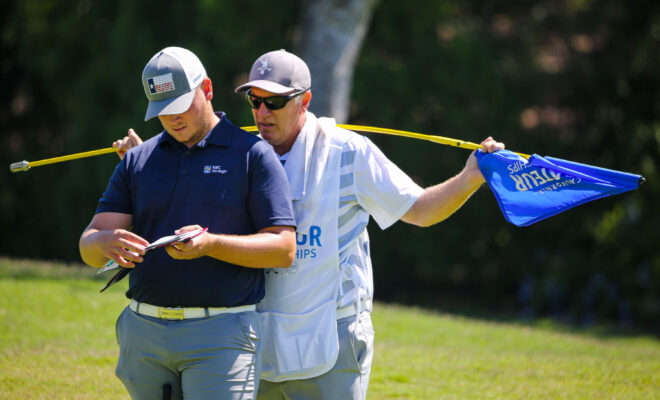SCARECROW

The Sequel at Gamble Sands Set to Open in August
Photos by Darin Bunch
At 7:10 a.m., the sun peeks over the ridge and the sage-smothered plains are brushed with golden light. From my cozy room on the ridge, I can see a sliver of Scarecrow — the brand-new David McLay Kidd course at Gamble Sands — shimmering in the morning glow. I grab my photography equipment and make a dash for the door. Lights, camera, action.
Sequels are rarely as good as the original film. If it isn’t the watered-down plot, it’s the B-team actors that can’t hold a candle to the original cast. The jokes are stale. The fun is over. Caddyshack II, anyone?
While it may work that way in Hollywood, in the golf world, thankfully, it’s often not the case. The second courses, the follow-ups, the encores, at many of the top resorts in the world have risen to the occasion. And then some. Pacific Dunes at Bandon Dunes, Cabot Cliffs at Cabot Cape Breton, Mammoth Dunes at Sand Valley and Pinehurst No. 2 are a few prime examples.
So, yes, the question at Gamble Sands — that high-desert golf oasis that parades atop sun-soaked ridges near Brewster, Washington — is whether the second full-length David McLay Kidd “feature” will win another “Oscar.”
ACCLAIMED ORIGINAL
The first course, Sands, opened in 2014 to widespread acclaim. Golfers loved — and still do — the broad playing corridors, the fast-and-firm turf, the syrupy-smooth routing, the exceptional lake and mountain views, the playability. It remains one of Kidd’s most-loved designs.
And the critics agree. Sands has “run down the red carpet” and fetched numerous accolades and awards. On the resort’s website, they list 19 major awards from the top publications in the game.
Everything from “Best Course in the State” to a top-30 spot on “America’s 100 Greatest Public Courses” has been doled out to Sands. So, without a doubt, Scarecrow has an extremely high bar to try and measure up to.
I was tickled pink to get a chance to see for myself just how Scarecrow stacks up. Last fall I got my chance. The icing on the cake was that both David McLay Kidd and lead architect Nick Schaan were there for a “preview.” (Scarecrow is scheduled to open in August, along with 40 new golf-view rooms at the Inn at Gamble Sands.)
I’ll cut to the chase. Scarecrow will not go down in history as a Caddyshack II. This ain’t no flop. More accurately, in terms of sequels, we’re in The Empire Strikes Back territory. And that, in case you’re not a Star Wars junkie, is a pretty lofty assessment.
For starters, the site itself is actually better than the original course. “It’s more technical,” said Kidd, who basically handed the reins to Schaan to take Scarecrow to the finish line. “There is more elevation change, the greens are smaller, the bunkering is more penal, there are more natural features that have been incorporated and missing shots will have a greater consequence. I’d say Scarecrow is at least a couple of shots tougher.”
While the terrain on Scarecrow facilitates a tougher and trickier test of golf, its DNA is the same. In other words, golfers can expect massive fairways, plenty of bailout areas, wild and creative contours and multiple routes to get to the greens. The character of the course, including the playability, is quite similar.
Sure, “Sands on steroids” might be a tempting moniker to use. However, in my opinion, it’s too strong a statement. Although there is a higher intimidation factor, Scarecrow is not the mean-spirited stepchild. Like Sands, it’s playable — thanks, in large part, to the firm-and-fast turf, width and ground-game options — for resort players. Drivable par-4s, reachable par-5s and easier line options for the less skilled are prevalent throughout the routing.
Siblings but not Twins
“The courses are siblings, but they’re not twins,” said Schaan during our round. “We want the argument of which one is better. A little healthy competition within a family can be a good thing.”
A good example of Scarecrow’s true character is the 16th, a fierce-looking par 3 with a massive green on the other side of a giant gully. My first reaction upon seeing the hole was, “OK, so where’s the ground-game option here? That’s a 220-yard forced carry.”
Schaan, upon hearing my lament, piped up quickly. “Just hit it 40 yards left of the pin over that rise where the carry is only a buck-fifty. Trust me. You’ll like it.”
Sure enough, my ball caught the hidden kicker slope and funnelled down onto the green. Easiest bogey I’ve ever made.
Unlike Sands, where the front nine boasts the most drama and best views, it’s the back nine on Scarecrow where things intensify. Powered by the best view on the entire property, the 10th is an awesome and intimidating start. It darts down a hill and features a slender green beckoning at the base of the bluff. Like basically every hole on the property (including those on Quicksands, the riotous 14-hole par-3 course), it’s defended by a ragged mob of unruly pits and bunkers.
“This is grand golf in a grand theatre. It’s a sequel that easily meets — and perhaps beats — the original.”
But, really, the entire back nine, which features one creative and captivating concoction after another, is brilliant. And, without a doubt, that wall-to-wall fescue, a staple at Gamble Sands, yields a multi-dimensional brand of golf that is always fast, flowy and fun.
With its sweeping scope and lavish, lay-of-the-land looks, Scarecrow certainly has the feel of a big-budget epic. This is grand golf in a grand theatre. It’s a sequel that easily meets — and perhaps beats — the original. It’ll be an argument every golfer will have upon experiencing Gamble Sands.











